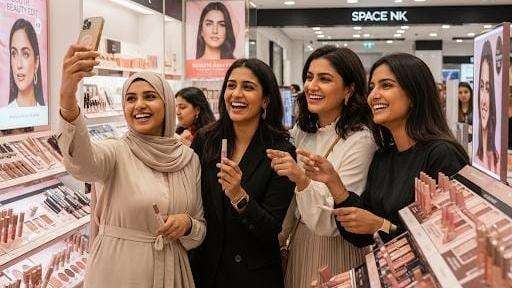How Kulfi and Kay Beauty's UK Launch Marks a Cultural Shift for British Bangladeshi, British Muslim & British South Asian Communities
The British beauty landscape is undergoing a significant and long-overdue cultural reset. For generations, the British Bangladeshi, British Muslim, and wider British South Asian communities have navigated a beauty industry that largely overlooked their unique skin tones and cultural needs. Now, with the high-profile launch of two powerhouse South Asian-owned brands—Kulfi Beauty and Kay Beauty—at luxury retailer Space NK, a new era of inclusivity and representation is dawning.
This moment is more than just a retail expansion; it's a powerful validation of a community that has often felt like an outsider in the mainstream beauty world. For many British Muslims and those of Bangladeshi, Pakistani, and Indian descent, the struggle to find foundations, concealers, and even vibrant eyeshadows that catered to their specific undertones and address common concerns like hyperpigmentation has been a lifelong challenge. Brands have historically offered a limited spectrum of "brown" shades, failing to capture the rich, complex diversity of South Asian skin.
The arrival of Kulfi Beauty, founded by Priyanka Ganjoo, and Kay Beauty, founded by Bollywood icon Katrina Kaif, directly addresses this void. Kulfi's playful, vegan, and cruelty-free approach with culturally resonant shade names like "Plum Pataka" and "Chamak Challo" creates an immediate, personal connection. These names are not just a marketing gimmick; they're a "glittery, sparkly amalgamation" of home and heritage, sparking a sense of belonging for many who felt their culture was confined to their home life.
Similarly, Kay Beauty's launch is a landmark event for the British South Asian community. For British Muslim women, who often grew up watching Bollywood films with their families, the brand's presence in a major UK retailer feels like their world is finally being seen and celebrated on the high street. The brand's standout Intense Black 24H Kajal Eyeliner Duo is a testament to this connection. Kajal, a staple in South Asian beauty rituals and often one of the first makeup items a young girl from the community uses, is a powerful symbol. The brand's success is rooted in its understanding of these cultural nuances, creating products that are both high-performing and deeply personal.
This trend extends beyond just these two brands. The UK's beauty market has seen a growing number of independent British South Asian entrepreneurs making their mark, such as brands like CTZN Cosmetics, founded by three Pakistani siblings, and Fable & Mane, which modernises the traditional Indian practice of hair oiling. These brands, often championed by prominent British Asian influencers like Amena Khan and Sabina Hannan, are building on the foundation laid by pioneers like Zukreat and are pushing for even greater representation and diversity in the industry.
This movement is not simply about new products; it's about shifting the narrative of beauty to be more inclusive and authentic. For British Bangladeshi and British Muslim women, who are navigating both their faith and their identity, this representation matters. It tells them that their unique heritage is not only beautiful but also commercially viable. This newfound visibility on major retailer shelves is a testament to the power of the British South Asian consumer and a promising sign for the future of a truly diverse and inclusive beauty industry.








.svg)

